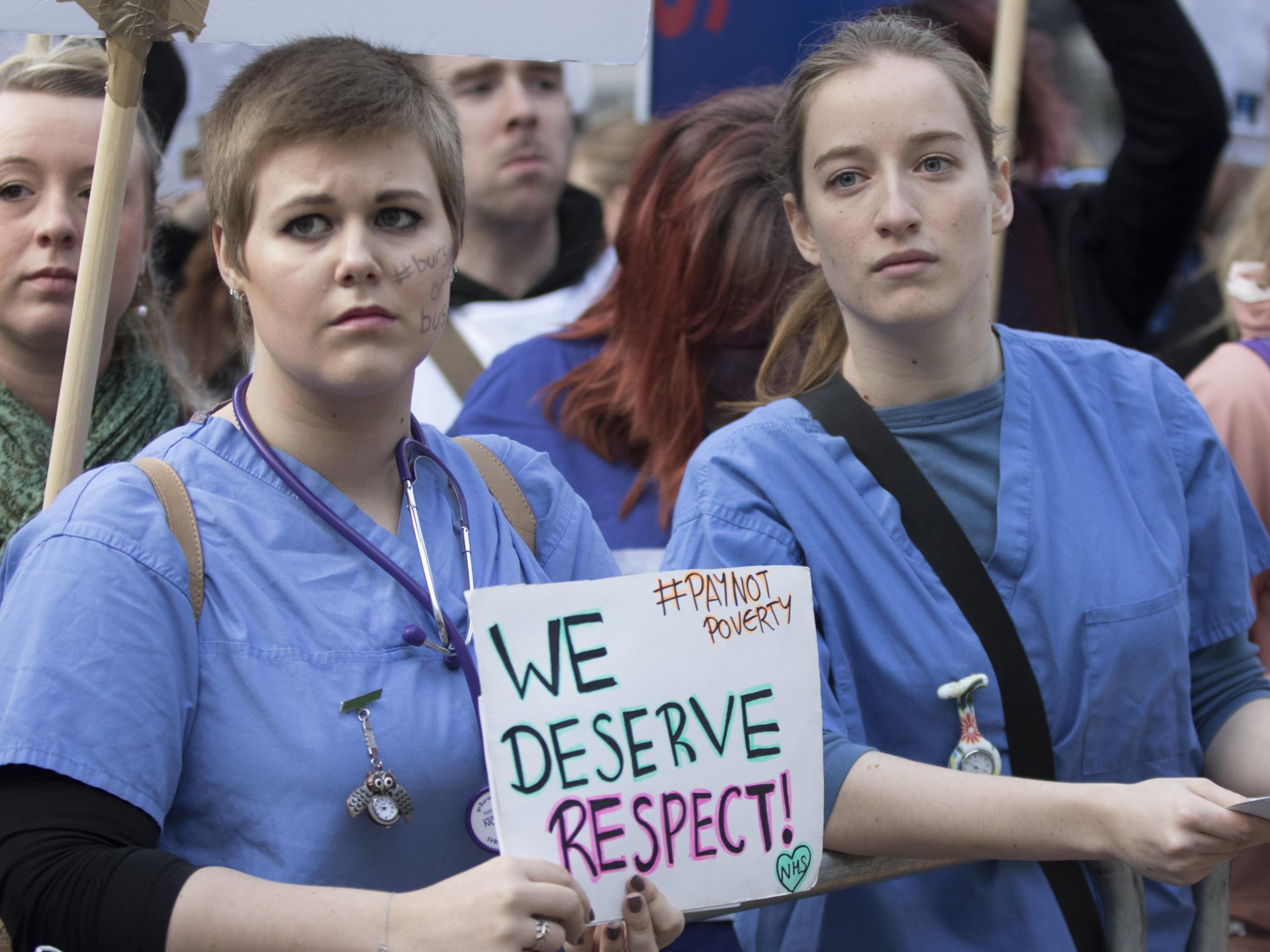More NHS nurses and midwives leaving than joining, new figures show
Between 2016 and 2017, 20 per cent more people left the nursing register than joined it

Your support helps us to tell the story
From reproductive rights to climate change to Big Tech, The Independent is on the ground when the story is developing. Whether it's investigating the financials of Elon Musk's pro-Trump PAC or producing our latest documentary, 'The A Word', which shines a light on the American women fighting for reproductive rights, we know how important it is to parse out the facts from the messaging.
At such a critical moment in US history, we need reporters on the ground. Your donation allows us to keep sending journalists to speak to both sides of the story.
The Independent is trusted by Americans across the entire political spectrum. And unlike many other quality news outlets, we choose not to lock Americans out of our reporting and analysis with paywalls. We believe quality journalism should be available to everyone, paid for by those who can afford it.
Your support makes all the difference.The number of nurses and midwives leaving the profession has risen 51 per cent in just four years, with those under the age of retirement citing low pay and poor working conditions.
New figures from the Nursing and Midwifery Council (NMC) show that for the first time in recent history more midwives and nurses are leaving the register than are joining, with homegrown UK nurses leaving in the largest numbers.
Between 2016 and 2017, 20 per cent more people left the register than joined it, and among those first registered in the UK, the figure was 45 per cent.
The Royal College of Nursing (RCN) and the Royal College of Midwives (RCM) called on the Government to scrap the pay cap as a matter of urgency to stem the numbers going.
The data shows that, following yearly rises since 2013 in the numbers on the register, there was a drop in 2016/17 of 1,783 to 690,773.
During April and May this year, there has been a more dramatic fall, with a further 3,264 workers leaving the profession.
The overall number of leavers - which includes UK, overseas and EU registrants – has increased from 23,087 in 2012/13 to 34,941 in 2016/17.
Leavers among those first registered in the UK – who make up 85% of the entire register – jumped from 19,819 in 2012/2013 to 29,434 in 2016/2017.
Saffron Cordery, director of policy and strategy at NHS Providers, said: “These figures provide further evidence of the severe workforce problems NHS trusts face.
“This goes beyond the concerns over Brexit – worrying though they are.
“The reduction in numbers is most pronounced among UK registrants. And it is particularly disappointing to see so many of our younger nurses and midwives choosing to leave.”
She said a new staff retention programme will offer support to those NHS trusts with the highest leaving rates.
“However, until we address the underlying issues driving retention problems, including the pay cap and the unsustainable workplace pressures, these approaches will only have a limited impact.”
The data also shows that the number of EU workers (who make up 5 per cent of the register) leaving has increased from 1,173 in 2012/2013 to 3,081 in 2016/2017.
Leavers from overseas have risen from 2,095 in 2012/2013 to 2,426 in 2016/2017.
The data also showed a rise in the number of nurses and midwives below retirement age leaving the profession.
In 2016/17, 7,760 of those going were aged 56 to 60, while there were 4,789 leavers aged 51 to 55 - almost double the figure for 2012/13.
The number of leavers in the 21 to 30 age group also almost doubled from 1,510 to 2,901.
Rising numbers of staff left for similar jobs abroad, with 4,153 “verification requests” made in 2016/17.
Of 4,544 people surveyed in the last year on reasons for leaving, just under half said they were not retiring.
Among this group, top reasons for leaving were working conditions (for example staffing levels and workload), cited by 44 per cent, a change in personal circumstances (such as ill health), cited by 28 per cent and disillusionment with the quality of care provided to patients, cited by 27 per cent.
Other reasons included leaving the UK (18 per cent) and poor pay and benefits (16 per cent).
Of 247 EU leavers, 32 per cent said Brexit had encouraged them to work outside the UK.
Janet Davies, chief executive of the RCN, said: “Patients are paying the price for the Government's failure to plan for the future and it looks set to get worse.
“With more people leaving than joining, the NHS will be further than ever from filling the 40,000 vacant nurse jobs in England alone.
“The average nurse is £3,000 worse off in real-terms compared to 2010.
“The 1 per cent cap means nursing staff can no longer afford to stay in the profession and scrapping student funding means people can no longer afford to join it.”
Jon Skewes, director for policy at the RCM, said: “These are worrying figures for maternity services and for a profession that is already 3,500 midwives short of the numbers needed in England, and with retirement bulges threatening future shortages in other UK countries.”
He said pay freezes and increasing workloads had left workers “demoralised and disillusioned”.
A Department of Health spokeswoman said: “We are making sure we have the nurses we need to continue delivering world-class patient care - that's why there are almost 13,100 more on our wards since May 2010 and 52,000 in training.
“We also know we need to retain our excellent nurses and earlier this week we launched a national programme to ensure nurses have the support they need to continue their vital work.”
Join our commenting forum
Join thought-provoking conversations, follow other Independent readers and see their replies
Comments